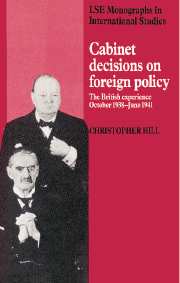Book contents
- Frontmatter
- Contents
- List of figures
- List of tables
- Acknowledgements
- Preface
- 1 Cabinets, foreign policies and case-studies
- 2 Constructing the Polish Guarantee, 15–31 March 1939
- 3 The Soviet question, April–August 1939
- 4 Entry into war, 1–3 September 1939
- 5 Reacting to the ‘peace offensive’, October 1939
- 6 To continue alone? May–July 1940
- 7 The longer term: War Aims and other committees, October 1940–June 1941
- 8 Decision-making in Cabinet
- Appendix 1 The Chamberlain Cabinet, 31 October 1938–3 September 1939
- Appendix 2 Attendance at the Foreign Policy Committee of the Cabinet, 14 November 1938–25 August 1939
- Appendix 3 Neville Chamberlain's statement in the House of Commons, 12 October 1939
- Appendix 4 Lord Halifax's paper for the War Aims Committee, October 1940
- Appendix 5 Anthony Eden's speech at the Mansion House, 29 May 1941 (extract)
- Notes
- Bibliography
- Index
- LSE MONOGRAPHS IN INTERNATIONAL STUDIES
8 - Decision-making in Cabinet
Published online by Cambridge University Press: 02 February 2010
- Frontmatter
- Contents
- List of figures
- List of tables
- Acknowledgements
- Preface
- 1 Cabinets, foreign policies and case-studies
- 2 Constructing the Polish Guarantee, 15–31 March 1939
- 3 The Soviet question, April–August 1939
- 4 Entry into war, 1–3 September 1939
- 5 Reacting to the ‘peace offensive’, October 1939
- 6 To continue alone? May–July 1940
- 7 The longer term: War Aims and other committees, October 1940–June 1941
- 8 Decision-making in Cabinet
- Appendix 1 The Chamberlain Cabinet, 31 October 1938–3 September 1939
- Appendix 2 Attendance at the Foreign Policy Committee of the Cabinet, 14 November 1938–25 August 1939
- Appendix 3 Neville Chamberlain's statement in the House of Commons, 12 October 1939
- Appendix 4 Lord Halifax's paper for the War Aims Committee, October 1940
- Appendix 5 Anthony Eden's speech at the Mansion House, 29 May 1941 (extract)
- Notes
- Bibliography
- Index
- LSE MONOGRAPHS IN INTERNATIONAL STUDIES
Summary
Between them, the six case-studies in this book have generated a wealth of material on the Cabinet and foreign policy, and each of them could easily have been replicated six times over – such is the level of business conducted by a major power in a period of stress, and the consequent size of the archives available to scholars. The law of diminishing marginal returns, however, means that conclusions become apparent well before every seam has been mined, and this is the basis on which the case-study method is justified. The intention here has been, by focusing on a limited period, to provide a crosssection through the British foreign policy process at its highest level, and from an analytical perspective. It is now possible to summarise the themes which have been emerging in the course of the empirical investigation represented by these cases.
The main focus has been on the nature of Cabinet government in the context of foreign policy, a subject which has so far not attracted detailed attention. The related but rather varied kinds of problem which we have seen the British government tackling between 1938 and 1941 have not produced direct support for either of the two main schools of thought on the operations of the Cabinet in general, which James Barber has called ‘the Presidential school’ and ‘the chairmanship school’. Although any great debate such as this tends to harden into a series of over-simplifications, the argument about whether the Prime Minister dominates or merely orchestrates the Cabinet is still one of the main issues in the study of British politics.
- Type
- Chapter
- Information
- Cabinet Decisions on Foreign PolicyThe British Experience, October 1938–June 1941, pp. 224 - 247Publisher: Cambridge University PressPrint publication year: 1991



